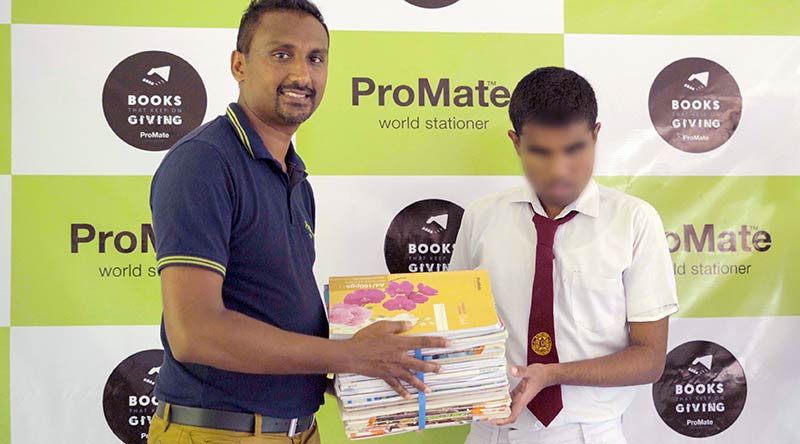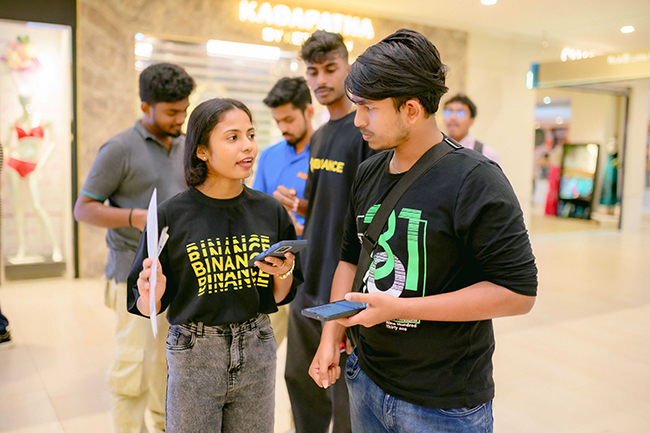Business
ProMate gives used exercise books a second life to aid visually impaired students’ education

Leading stationery manufacturer ProMate Sri Lanka participated in an impactful book collection drive recently to help visually impaired students pursue their studies, engage in communication, and interact with the world. ProMate is a product of one of the most famed and oldest pioneer book publishers in Sri Lanka, Ratna Publishers.
Due to rapid inflation and rising costs, the price of school supplies has also increased by a staggering 300%. This has exacerbated existing challenges for students, especially schools for the blind across the country faced with sourcing the necessary paper for their students.
It is a known fact that the enrollment of visually impaired students at schools is dismal and few receive a proper education. Braille paper is expensive and often in short supply. ProMate identified the importance and urgency of upcycling used exercise books for their education, and also as a means to expand access to learning. After all, to a visually impaired student, a used exercise book is like brand new.
Supporting this worthy cause, ProMate lent its extensive branch network as collection points for the public to donate used CR notebooks. It was noted that each book provides six pages that can be used for Braille writing. By upcycling used books, ProMate realized that it could maximize resources for visually impaired students’ education.
ProMate estimates that papers worth LKR 500 million are discarded annually in Sri Lanka. Upcycling them for social good is also environmentally and economically beneficial. ProMate collected used books, trimmed the pages to A4 size, and distributed them to the special schools most in need. ProMate supplied the A4 sheets to schools based on the number of students.
The company also aims to deliver papers using cast-off books to aid Braille education nationwide, as the materials will help hundreds of students continue their studies despite fiscal challenges.
As part of the campaign to create awareness for the cause and educate the public on upcycling used books, the company also collaborated with advertising agency Ogilvy to create a heartwarming video. The video depicts how students can pass down used books to benefit those who are visually impaired, just as families hand down toys or clothes between siblings.
Volunteer Sri Lanka, a non-profit, also partnered to expand the reach of drop-off locations using its volunteer base across provinces, widening the collection network. The initiative enables Sri Lankans nationwide to come together and support the education of visually impaired children, enabling the public to uplift disadvantaged communities.
Business
Binance signals a maturing Crypto pitch in Sri Lanka

Frames crypto investing as a ‘measured journey rooted in knowledge and security’
In an industry often characterised by velocity, volatility and viral marketing, Binance’s latest community activation in Sri Lanka suggested a deliberate recalibration of its investor messaging.At its #BinanceHODLove event held at One Galle Face Mall, the world’s largest crypto exchange by trading volume chose a Valentine’s-themed slogan that stood out for its restraint: “Real Love Doesn’t Rush, Neither Should Crypto: A Valentine’s Message for Smart Investors.”
Behind the seasonal branding lies a more strategic theme – one that aligns with the crypto industry’s post-cycle shift toward compliance, literacy and risk awareness.
Sri Lanka’s retail investor base has demonstrated periodic interest in digital assets, particularly during phases of currency pressure and global crypto rallies. Yet market participation has also exposed gaps in financial literacy and susceptibility to high-yield promises.
Binance’s messaging at the event leaned heavily into investor caution. Participants were reminded to scrutinise unsolicited offers, avoid guarantees of quick returns, and protect sensitive information such as private keys and passwords. In a market where informal crypto schemes have occasionally surfaced, such emphasis reflects reputational risk management as much as community engagement.
The company also spotlighted Binance Academy, its educational platform, positioning knowledge acquisition as foundational to long-term participation in blockchain ecosystems.
While the event featured raffles and consumer electronics giveaways to drive footfall, the broader objective appeared to be brand consolidation at the grassroots level. Physical activations in high-traffic urban centres suggested a hybrid strategy: digital scale complemented by localised trust-building.
For a global exchange operating in increasingly scrutinised regulatory environments, nurturing responsible retail participation is both a defensive and expansionary move. By framing crypto investing as a “measured journey rooted in knowledge and security,” Binance is aligning itself with the industry’s pivot toward sustainability rather than speculative exuberance.
The subtext of the campaign was clear: growth in emerging markets like Sri Lanka will depend less on price momentum and more on credibility.
Binance’s Valentine’s message, therefore, may be less about romance and more about risk calibration. In that sense, the slogan captured a broader industry truth: endurance, not impulse, will define the next phase of digital asset adoption.
By Sanath Nanayakkare
Business
Unlisted tax jitters frizzle CSE rally; analysts flag spillover fears

Morning gains on the Colombo Stock Exchange (CSE) evaporated sharply in afternoon trade yesterday, as a wave of nervous selling swept through the market triggered by speculation that the government is mooting a fresh 10-15 percent tax on unlisted corporates. Although the proposed levy is currently targeted at entities outside the CSE purview, market participants grew wary that the measure could signal a broader shift in fiscal policy, stoking fears of future tax hikes that may eventually engulf listed companies and dent corporate earnings.
Amid those developments, the turnover was capped at a mere Rs 369 million despite fourteen crossings.
The top seven crossings mainly contributed to the turnover were Commercial Bank 1.60 million shares crossed to the tune of Rs 359.7 million and its share price traded at Rs 223, Renuka Foods 2.7 million shares crossed to the tune of Rs 179.6 million and its share price traded at Rs 63.50, LOLC Holdings 300,000 shares crossed to the tune of Rs 171.9 million and its share price traded at Rs 573, Sampath Bank 821,000 shares crossed to the tune of Rs 132 million and its share price traded at Rs 161, Commercial Bank (Non-Voting) 484,000 shares crossed to the tune of Rs 98.9 million and its share price traded at Rs 204, Sierra Cables two million shares crossed to the tune of Rs 69.6 million and its share price traded at Rs 34.80 and Citizens Developments Business Bank (Non-Voting) 200,000 shares crossed to the tune of Rs 62.9 million and its share price traded at Rs 324.
In the retail market top seven companies that have mainly contributed to the turnover were Renuka Agri Rs 1.14 billion (82.4 million shares traded), Softlogic Finance Rs 653.9 million (115 million shares traded), Sampath Bank Rs 270.8 million (1.65 million shares traded), Softlogic Capital Rs 230 million (19.3 million shares traded), JKH Rs 201 million (nine million shares traded) ,LOLC Holdings Rs 171.9 million (297,000 shares traded) and LMF Rs 171 million (1.8 million shares traded). During the day 369 million shares volumes changed hands in 39059 transactions.
It is said that banking and agriculture related companies performed well. In the banking sector Sampath Bank and Commercial Bank performed well. Further manufacturing sector especially JKH also significantly active in the market.
By Hiran H Senewiratne
Business
ComBank loan book grows by Rs. 541bn to top Rs. 2tn

The Commercial Bank of Ceylon achieved another performance milestone in 2025, becoming the first private sector bank in the country to expand its loan book beyond Rs. 2 Tn., with a growth of Rs. 541 Bn. over 12 months at a monthly average of over Rs. 45 Bn., demonstrating its commitment to national economic resurgence.
Recording the highest annual loan growth in absolute terms in the history of the institution, the Bank said gross loans and advances for the year ending 31st December 2025 grew by 36.37% to Rs. 2.028 Tn., taking total assets to Rs. 3.258 Tn. This reflected an increase of Rs. 468 Bn. or 16.78% and demonstrated more than double the growth recorded in 2024. The Bank’s net assets value per share improved to Rs. 198.30 from Rs. 170.94 at end 2024.
Deposits grew by 16.65% or Rs. 372 Bn. over the 12 months to end the year at Rs. 2.6 Tn., reflecting an average deposit growth of over Rs. 30 Bn. per month despite relatively lower interest rates, the Bank said. The CASA ratio of the Bank, which is considered to be the industry’s best, stood at 39.65% from 38.07% as at 31st December 2024.
Sharhan Muhseen, Chairman of Commercial Bank said: “We remain focused on the fundamentals that sustain shareholder value: earnings resilience, balance sheet strength, disciplined risk management and a strategy that is responsive to evolving customer and market needs. Our 2025 performance affirms the value of that focus.”
Sanath Manatunge, Managing Director/CEO of Commercial Bank said: “In 2025, we proved that scale and discipline can move together, growing lending and accelerating digital activity while strengthening asset quality and balance sheet resilience.”
In a filing with the Colombo Stock Exchange (CSE) the Bank said it recorded gross income of Rs. 354.81 Bn. for the year ending 31st December 2025 reflecting growth of 13.70% over the normalised figure for 2024, after adjusting for the impacts of restructuring of Sri Lanka International Sovereign Bonds (SLISBs) accommodated in that year, in order to avoid potential distortion of growth figures. Net gains / (losses) from derecognition of financial assets in the Income Statement for 2024 (as reported) included a derecognition loss on restructuring of SLISBs amounting to Rs. 45.108 Bn.
-

 Features7 days ago
Features7 days agoWhy does the state threaten Its people with yet another anti-terror law?
-

 Features7 days ago
Features7 days agoReconciliation, Mood of the Nation and the NPP Government
-

 Features7 days ago
Features7 days agoVictor Melder turns 90: Railwayman and bibliophile extraordinary
-

 Features6 days ago
Features6 days agoLOVEABLE BUT LETHAL: When four-legged stars remind us of a silent killer
-

 Features7 days ago
Features7 days agoVictor, the Friend of the Foreign Press
-

 Business6 days ago
Business6 days agoBathiya & Santhush make a strategic bet on Colombo
-

 Business6 days ago
Business6 days agoSeeing is believing – the silent scale behind SriLankan’s ground operation
-

 Features7 days ago
Features7 days agoBarking up the wrong tree















